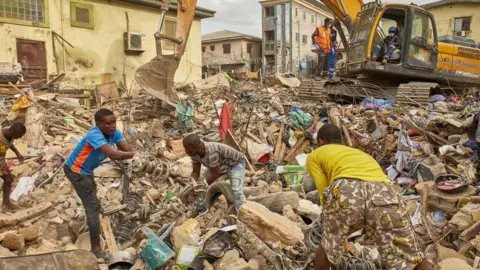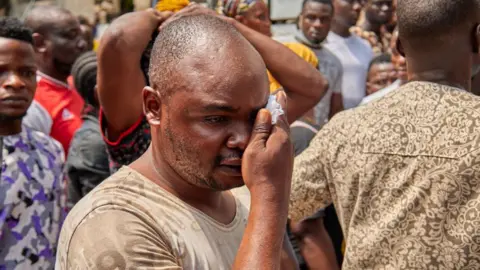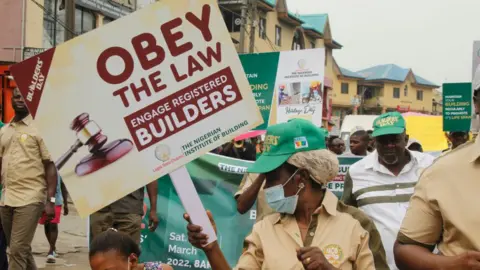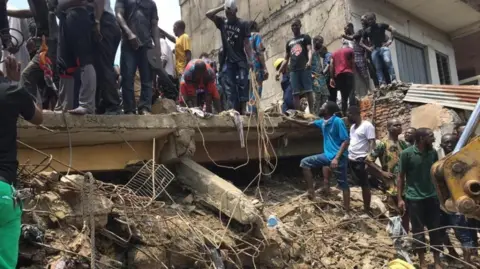 Getty Images
Getty ImagesA building has collapsed in Nigeria’s megacity, Lagos, once every two weeks on average so far this year.
Whereas the commercial cost can be calculated, a figure can never be put on the value of the lives lost underneath the rubble.
The gaps among the buildings, replaced by piles of debris, represent a failure of governance as well as giving rise to allegations of contractors trying to cut corners to save money.
There are regulations, there are maintenance schedules, there are inspectors – but the system does not work.
Those responsible are never held to account, and so nothing ever changes.
Lagos, dubbed by one expert who spoke to the BBC as ” the building-collapse capital of Nigeria”, has seen at least 90 buildings falling down in the last 12 years, leaving more than 350 people dead, according to the Council for the Regulation of Engineering in Nigeria.
One of the most notorious incidents was in 2021.
Sunday Femi was just metres away, in the upmarket suburb of Ikoyi, when a 21-storey block of luxury flats under construction collapsed, killing 42 people.
After the loud crashing sound, he was engulfed in dust.
“Like many, I rushed inside trying to see if I could help some of the people trapped. Sadly I knew some of those who died and I think about it every day,” he says, reflecting on what happened nearly three years ago.
 Getty Images
Getty ImagesThe drinks seller had been speaking to some of the construction workers moments before they entered the building site.
He still works nearby and the chatter among the locals often turns to those events and the possible cause.
Metal sheeting protects the site from prying eyes but mounds of broken concrete can still be seen through the gaps in the gate.
Knocking on the entrance to the ill-fated compound, two fierce-looking security guards opened up and said they had instructions not to allow anybody into the premises except state government officials.
Just as the place is sealed to the public so is the official investigation into the collapse – it has been sitting with the state governor since he received it in 2022.
A list of recommendations has reportedly been drawn up by a panel of experts following the investigation but that also has not been made public.
The BBC has repeatedly asked the Lagos state authorities to see the recommendations, and the report into the Ikoyi building collapse, but neither has been made available.
The coroner, however, has had her say and in 2022 she did not hold back.
In a damning judgment on the deaths, Chief Magistrate Oyetade Komolafe, attributed the building collapse to the irresponsibility and negligence of the government agencies that were supposed to approve and supervise the plans and construction.
Lagos’s population is booming and is now estimated to stand at more than 20 million.
As the city grows so does the demand for housing and commercial property, and it can sometimes feel like a giant building site with construction going on everywhere.
Before work can begin, plans need to be approved by Lagos state’s Physical Planning Permit Agency. Then inspectors from the Lagos State Building Control Agency (LASBCA) are supposed to look at the site as well as check the progress at every stage of construction.
And the Standards Organisation of Nigeria should make sure that only suitable building material gets to the market.
But on many occasions the procedures are not followed.
 Getty Images
Getty ImagesInside the LASBCA’s offices everything appears calm – there is no sense of the urgency of the problems or challenges it faces.
Spokesperson Olusegun Olaoye acknowledges the criticism but dismisses allegations that officials have been bribed to issue fake certificates and rather blames a lack of resources.
“At the moment we have about 300 building inspectors and supervisors but we are looking to add to that,” he says.
Experts agree that more supervisors are needed.
Muhammad Danmarya, architect and construction expert, says they should number in their thousands.
“Three hundred is just not right for a state like Lagos. Each local government area should have at least 100 inspectors and supervisors and Lagos has 57 of those areas,” he argues.
“There’s always construction going on everywhere you look, so it’s important that inspection and supervision is going on all the time.”
In the absence of that regime across the state, some less scrupulous companies are getting away with violating building codes, using sub-standard materials and employing poorly trained workers – three of the reasons cited for the high frequency of collapses.
“They just come here to pick us up any time they have a job for us and pay us after we are done,” says labourer Habu Isah, who has worked on construction sites for years.
“I have never undergone any training, I just learned everything on the job.”
But even if violations are identified in the wake of a collapse, the state’s building agency does not take any legal action.
“To my knowledge there haven’t been any prosecutions in the past as far as building collapses in Lagos are concerned,” LASBCA’s Mr Olaoye admits.
“I know the statistics are worrying but there are ongoing efforts to halt the trend.”

Alleged political influence is a barrier to pursuing prosecutions.
“If you are connected to people in power, even if you are the culprit in a building collapse case nothing will happen to you,” says a Lagos state politician, who talked to the BBC on the condition of anonymity.
“We’ve seen it so many times, some of the high-profile cases have to do with structures of highly placed people and they are still roaming around freely.
“In Nigeria when you are rich and connected you can avoid problems easily.”
With 19 building collapses already recorded so far this year by the Lagos State Emergency Management Agency, the final total is likely to be the highest in the past decade.
But lessons may still go unlearnt.
The head of the Council for the Regulation of Engineering in Nigeria recently said that the country lacked the capacity to properly investigate what is going on.
“We don’t have the expertise, the equipment, and the resources to do so,” said Prof Sadiq Abubakar.
In the meantime, construction workers and others will carry on paying with their lives.
Additional reporting by Andrew Gift
More BBC stories from Nigeria:
 Getty Images/BBC
Getty Images/BBC









